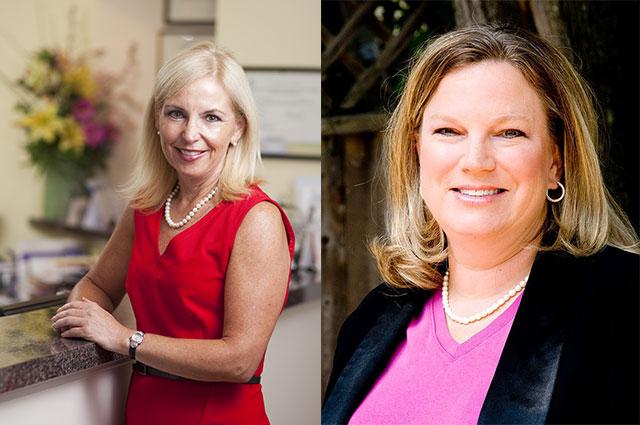Leading the Profession in a Time of Turmoil

By Kim Thurler
On Sunday, March 15, with COVID-19 cases soaring, Janis Moriarty, D94, took her toughest step as president of the organization that represents dentists across Massachusetts: recommending the Massachusetts Dental Society’s 5,000 members postpone all non-emergency care, starting the next day.
“We were the first state dental society in the country to take such action. We knew it would mean closures, layoffs, and furloughs, but we did it with the best interest of keeping everyone safe,” said Moriarty, who put non-urgent services at her own practice in Winchester, Massachusetts, on hiatus.
That message was, predictably, unpopular.
“Janis lived through a tornado,” said Mary-Jane Hanlon, D97, then MDS president-elect, who succeeded Moriarty July 1. “There was a lot of pushback from members.”
An executive order from Massachusetts’ governor soon mandated such a pause, and Moriarty worked with MDS trustees and staff, including a brand-new executive director, to refocus the society’s strategic plan on crisis management. The most urgent need was accurate information. “MDS received an amazing number of calls to clarify even the most basic information, such as what actually constitutes a dental emergency,” said Moriarty. “Many people just needed reassurance that they were doing the right things to keep everyone safe.”
Working remotely, the MDS team communicated through email, endless video calls, online town hall meetings, and a website that provided facts about the virus, safety protocols, and practice management. In the interest of health and safety, MDS freely offered information to non-members, which ultimately helped boost MDS ranks, noted Moriarty.
The MDS Health and Wellness Committee created a constituent Facebook support group, and Christina Pastan, D91, DG94, assistant clinical professor at Tufts School of Dental Medicine and director of mind-body wellness at the school, offered mindfulness and yoga sessions.
As Massachusetts began easing restrictions, MDS again pivoted, guiding its members on how to reopen safely and sustain their practices. The society’s foundation created a COVID-19 recovery fund, which, with the support of industry partners, raised $3.5 million to assist practices in obtaining essential personal protective equipment.
Moriarty and Hanlon agree that flexibility and willingness to face difficult issues head-on have been essential to leading the society during these turbulent times. In early June, amid a nationwide reckoning on racial inequality, they wrote to members to acknowledge that MDS “has not done enough within our own organization and profession to ensure diversity and inclusivity” and announced a task force on equity and racial justice. Leading the taskforce is Nicole Holland, assistant clinical professor and director of Health Communication, Education, and Promotion at TUSDM. A month later, with Hanlon barely a week into her presidency, the unexpected death of MDS’s executive director brought Hanlon and her colleagues personal as well as professional challenges.
“It’s been exhausting as well as meaningful to work together to support the profession” said Hanlon, TUSDM’s associate dean for clinical affairs. “The ability to collaborate in the dental profession is bar none better than any profession, anywhere. We found a silver lining that I always knew existed, but not to that extent.”